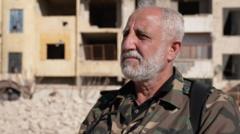For years, the relationship between Russia and Syria was characterized by mutual strategic benefits, yet this alliance now presents challenges as Syria emerges from the shadows of Bashar al-Assad's regime. Rebels and civilians in Syria are expressing strong sentiments against Russian involvement, viewing Moscow as an enemy that has contributed to the devastation of their country. Ahmed Taha, a rebel commander from Douma, poignantly stated, “For us, Russia is an enemy,” highlighting the bitter memories of conflict and loss.
Historically, Russia intervened in the Syrian conflict in 2015, providing military support to Assad's regime at a time when it was under severe threat from rebel forces. Russian Foreign Minister Sergey Lavrov claimed the regime was on the verge of collapse, justifying Moscow’s military actions as a necessary measure. As part of its involvement, Russia not only aimed to bolster Assad but also sought to assert its influence in the Mediterranean region through military bases in Tartus and Hmeimim.
Despite this support, Assad's regime has faced persistent challenges, ultimately leading to its decline. Many Syrians now view Russia as complicit in the regime's atrocities, including widespread accusations of war crimes cited by various international human rights organizations. The destruction witnessed in cities like Eastern Aleppo and Douma remains a painful reminder of the conflicts fueled during the civil war.
Abu Hisham, a resident of Douma, summarized the general sentiment, stating, “The Russians came to this country and helped the tyrants, oppressors, and invaders.” Voices across Syria resonate with similar calls for Russia’s withdrawal, which many argue is necessary for a genuine reconciliation and reconstruction phase to commence—something envisioned by civilians like Mouna Ali Mansour from Hafir al-Tahta.
Despite the backlash from the populace, Syria's interim leadership appears more measured in its approach. Leader Ahmed al-Sharaa has indicated that while he recognizes the negative sentiment towards Russia, a complete estrangement may not be feasible. He described Syria's relationship with Moscow as "strategic," which suggests that future negotiations regarding Russian military presence will continue even amid public outcry.
This complex relationship raises questions about the future orientation of Syria’s military capabilities, heavily reliant on Russian military hardware dating back to the Soviet era. Analysts like Turki al-Hassan argue that rebuilding the Syrian military might necessitate maintaining some form of cooperation with Russia, given the historical ties that have characterized regional military dynamics.
Meanwhile, Russian officials have adopted a conciliatory tone, acknowledging the changing political landscape while asserting a continued commitment to assisting Syrian reconstruction efforts. Vassily Nebenzia, Russia's UN envoy, emphasized the importance of supporting the Syrian people in their time of need, seeking to project a narrative of partnership despite the prevailing anti-Russian sentiment among the population.
As Syria navigates its post-Assad era, the interplay between the desire for autonomy and the practicalities of foreign partnerships presents a challenging road ahead. Balancing national aspirations with the legacies of foreign interventions will be crucial in shaping the future of the country.


















